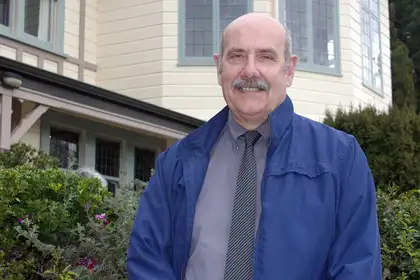
Professor Robert Freestone at the Manawatū campus.
Planning graduates need to hold on to their visions and ideals for creating affordable, sustainable homes and resilient communities, despite pressures to meet narrow economic development goals.
That’s the advice of visiting Australian planning professor Robert Freestone, who gave guest lectures to Massey University’s planning students and staff, and local council planners in Palmerston North this week.
Professor Freestone, from the Faculty of Built Environment, University of New South Wales, Sydney, says that when planning academics get together, affordable and smarter housing solutions are hot topics. “There’s no shortage of good ideas but they are not really being picked up by [the state] government.”
Housing affordability is a global issue confronting most big cities in developed countries around the world, he says. And while many cities suffer from “the inability of both private and public sectors in coming together to ensure an adequate supply of affordable housing”, there are success stories that New Zealand – particularly Auckland – can learn from.
These include otherwise expensive to live cities, such as New York, where regulations require some new housing developments to include a quota for affordable housing. He also cites London’s King’s Cross (and St Pancras) as a benchmark for urban renewal success with its mix of corporate offices, residential and heritage buildings, a new university, as well as cafes, galleries, shops and public spaces.
What not to do, he says, is adopt the style of Sydney’s latest urban renewal development, Barangaroo – a “big, corporate, muscular extension” of the city’s CBD spearheaded by billionaire James Packer and former prime minister Paul Keating.
He describes Barangaroo as “a monolithic, high corporate zone” driven by strong state government with very little local government input. “This happens when planning is taken away from the local community and quarantined behind fairly un-transparent boundaries in the hands of senior political figures.”
Planners urged to have their say
He urges today’s planning students and new graduates to “get engaged” and to “look for opportunities to influence things for the better, including public opinion.”
“Planning students don’t leave programmes with any shortage of optimism and idealism, and I can see at Massey and other programmes they go out fired up with visions of changing the world. The agendas are pretty common across the affluent world – housing affordability, sustainability and resilience.”
However, modern planning agendas are driven primarily by economic development, he warns. “I think the risk is that these goals can potentially compromise all those things that planning has to balance – wellbeing, community life, environmental sustainability.”
His seminars at the Manawatū campus were on Re-evaluating and re-valuing the garden suburb tradition of neighbourhood interior parks, and Securing design excellence in planning outcomes through competitive processes: Reviewing the Sydney CBD experience 2000-2017.
Professor Freestone’s research interests include planning history, urban development, metropolitan planning, and planning education. He has written and co-edited a number of books, and has served two terms as chair of New Zealand Planning Institute’s panels accrediting planning programmes.